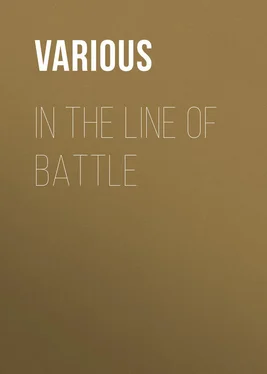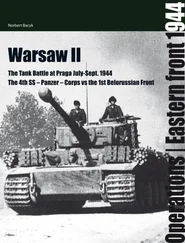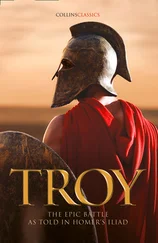Various - In the Line of Battle
Здесь есть возможность читать онлайн «Various - In the Line of Battle» — ознакомительный отрывок электронной книги совершенно бесплатно, а после прочтения отрывка купить полную версию. В некоторых случаях можно слушать аудио, скачать через торрент в формате fb2 и присутствует краткое содержание. Жанр: История, prose_military, Биографии и Мемуары, на английском языке. Описание произведения, (предисловие) а так же отзывы посетителей доступны на портале библиотеки ЛибКат.
- Название:In the Line of Battle
- Автор:
- Жанр:
- Год:неизвестен
- ISBN:нет данных
- Рейтинг книги:4 / 5. Голосов: 1
-
Избранное:Добавить в избранное
- Отзывы:
-
Ваша оценка:
- 80
- 1
- 2
- 3
- 4
- 5
In the Line of Battle: краткое содержание, описание и аннотация
Предлагаем к чтению аннотацию, описание, краткое содержание или предисловие (зависит от того, что написал сам автор книги «In the Line of Battle»). Если вы не нашли необходимую информацию о книге — напишите в комментариях, мы постараемся отыскать её.
In the Line of Battle — читать онлайн ознакомительный отрывок
Ниже представлен текст книги, разбитый по страницам. Система сохранения места последней прочитанной страницы, позволяет с удобством читать онлайн бесплатно книгу «In the Line of Battle», без необходимости каждый раз заново искать на чём Вы остановились. Поставьте закладку, и сможете в любой момент перейти на страницу, на которой закончили чтение.
Интервал:
Закладка:
Our salient, vulnerable and undoubtedly attractive to the Germans, was rushed by them, and they succeeded in breaking through and occupying a trench about a hundred yards away from our own and parallel with it. They came on with wonderful steadiness, advancing just as if they were on parade, scarcely breaking step at all. They came out of their trenches about a dozen at a time, formed two long lines, and literally seemed to walk over into the trench, though we were peppering at them all the time. They kept up an excellent covering fire, with the result that a good many of our own men were shot.
This was fair, open fighting, the sort of thing that a soldier expects, and into the spirit of which he can enter. It gave opportunities, too, for the display of the best qualities of warfare, and these were shown by a man I knew very well, Company Sergeant-Major F. W. Hall, of my company. In spite of a very heavy and at that time fatal fire, the sergeant-major rushed out from the shelter of his trench to bring in a wounded man who was lying in the open. He seemed to bear a charmed life, for he got clear of the trench and was untouched by the fire of the enemy.
The sergeant-major managed, by good fortune which seemed miraculous, to get as far as the wounded man; he seized him and started with his burden for safety. In fact he actually got him as far as the trench, then, when the worst seemed over and security was just within his reach, when he was getting over the parapet and men were loudly cheering him because of his success, he was shot and killed. But the uncommon courage of the action had been noticed, and later on, to the real gratification of all the Canadians, and especially those who knew him, the announcement was made that the dead hero had been awarded the Victoria Cross. Hall’s men were terribly shattered by the enemy’s rifle and machine-gun fire; but in spite of it all they held their ground, and the living remnant won great glory.
It was not long before I dropped. I did not recover till the fight had swept away to my right. Then I reported to an artillery officer who was near, and he showed me the way to Ypres, telling me also to go into the city for hospital treatment.
I cannot close my yarn without mention of Captain Northwood’s Company – No. 4. The company was not relieved – it could not be, because of the heavy call on troops – but it fought on doggedly till two platoons were captured. Yet there were no prisoners made except at a bitter cost to the Germans.
There were many heroes that day in No. 4 Company. I cannot name them all, but I must mention two of them who stand out pre-eminent – “Box-car” Kelly (now a King’s Corporal), and Corporal Sandford. Kelly did everything in his power to rally some of the British troops who were near him, while Sandford, a section-commander, did as much by his example of splendid courage as any officer I know.
That is my story.
If space permitted I might tell of Corporal Degan and his gallant band of hand-grenaders; how they bravely fought when hemmed in by the enemy; of Lieutenant Owens, who stood with an automatic pistol in each hand, cheering and swearing in the same breath, defending his comrades and destroying the Germans; of Sergeant Nobel (now a captain), who repaired a telephone-wire under an annihilating cannonade from German guns, and a score of other splendid fellows who utterly forgot themselves and their extremity, and risked their all upon the hazard of the glorious common cause.
CHAPTER IV
A LINESMAN IN GALLIPOLI
[A vivid understanding of the work which our soldiers did in Gallipoli during the earlier stages of the operations in the Dardanelles, and of the strange happenings which were of daily occurrence in fighting the German-led Turks, is given by this story, which is told by Private John Frank Gray, 5th Battalion Wiltshire Regiment.]
Everybody knows how the transport River Clyde , with two thousand British soldiers packed in her, was deliberately run ashore on V Beach, at the southern point of the Gallipoli Peninsula. Great holes had been cut in her steel sides, to make doors through which the men could get ashore when she was hard and fast, without embarking in any sort of craft. Land they did, in the end, though they suffered heavily through the Turks’ terrific fire. I did not see that famous and wonderful performance, but I disembarked, with my regiment, close to the transport while she was still aground. We had almost the same experience as the troops from the River Clyde had gone through. We forced a landing, in spite of barbed wire entanglements in the water, traps which had caught many a fine fellow and held him till the enemy’s fire got him. It is odd to talk of wire entanglements in the sea, grabbing and tearing you as you plunge into the water, to wade ashore; but there they were, one more new feature in a war that has been full of strange and devilish things. Before we landed in Gallipoli we had experience of transport, trawler, barge and pinnace; and we were no sooner at the end of the voyage from England than we were under deadly fire and in the thick of it.
We went right into the firing-line, and the Turks gave us more than a warm reception – it was hot. We were under fire all the time we were landing, but we had the uncommon good luck to suffer no loss. As we forced our way ashore we saw plenty of evidence of the desperate nature of the adventure of the men of the River Clyde ; but we were too much absorbed in our own affairs to pay much heed to what had happened to other fellows.
We had got ashore on July 16th at Seddul Bahr, and stayed there all night. So that we should be as comfortable as possible we made dug-outs in the face of the cliff. The cliff at that place is very hard, and we had plenty of blasting to do, as well as work with pick and shovel.
My mates and I had put plenty of elbow-grease into our own particular job, and had finished our dug-out and got into it, to be cosy for the night. It was very much like animals going to bed. We were worn out, and lost no time in going to sleep. I had gone off soundly and knew nothing till I was roughly roused by some fellows shouting, “Wake up! Wake up! Three of our chaps are buried alive!”
We did not need a second rousing. We all sprang up and rushed to a spot not far away, where we saw that there had been a fall of earth and rock, and we dug harder than we had ever dug before. At the end of it, having dug to a depth of three feet, and thrown the earth and rock away from us, we came across three poor chaps of my company who had been buried by a fall of earth, caused by them digging too far into the ground to give them shelter. They had undermined too much, and the earth-roof had collapsed and crushed them. We saw at once that there was no hope – the men looked as if they had been killed on the spot: they must have been dead an hour – but we put them on stretchers and the field ambulance men did all they could. But it was too late. Next day we dug graves for them and put crosses over. There are some fine graveyards out there, well cared for, and with barbed wire fences to preserve them. While we were burying our comrades the Turks fired on us continuously, and this had to serve as the last volleys over the fallen. That solemn and tragic beginning of my experiences after landing at Gallipoli will never fade from my mind.
Even at this early stage I noticed the extraordinary luck of war. Some of the King’s Own Lancasters had been in the trenches for fourteen days, and during the whole of that time they had had only twenty casualties. They left the trenches and came right up alongside of us, on a little bit of a mound. The Turks must have got wind that a lot of troops were on the move, for the shrapnel came bursting over the lot of us, especially the Lancasters, who in less than half an hour lost more than forty men, fourteen being killed and the rest wounded. Four or five of our own fellows were hit, so that we escaped lightly, and were able to send our stretcher-bearers to give a hand in getting the wounded soldiers to hospital.
Читать дальшеИнтервал:
Закладка:
Похожие книги на «In the Line of Battle»
Представляем Вашему вниманию похожие книги на «In the Line of Battle» списком для выбора. Мы отобрали схожую по названию и смыслу литературу в надежде предоставить читателям больше вариантов отыскать новые, интересные, ещё непрочитанные произведения.
Обсуждение, отзывы о книге «In the Line of Battle» и просто собственные мнения читателей. Оставьте ваши комментарии, напишите, что Вы думаете о произведении, его смысле или главных героях. Укажите что конкретно понравилось, а что нет, и почему Вы так считаете.












